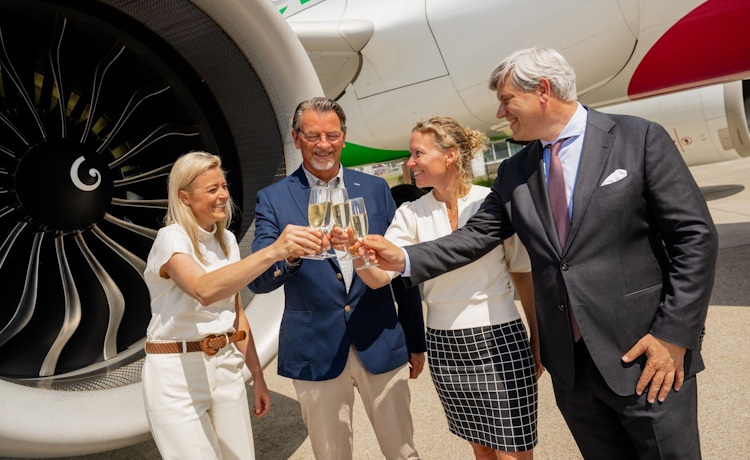
De Jong Intra Vakanties was the first to join Transavia’s sustainability partner programme. The travel organization from Ridderkerk purchases more sustainable aviation fuel through the program, with which the two companies work together step by step to make aviation more sustainable. The sustainability partner programme offers travel organisations that purchase seats from Transavia the opportunity to contribute to the purchase of SAF (Sustainable Aviation Fuel). In this way, they can make travel more sustainable. The program was launched at the end of last year. The signing of the partner programme took place on Thursday afternoon at hangar 5 at Schiphol-East, under the wings of a new Airbus A321neo. Transavia now has six of these aircraft that are more economical and quieter. Transavia believes it is important to reduce emissions from flying. The sustainability partner programme, in which Transavia seeks cooperation with its business partners, is one of the initiatives that contributes to this. Less emissions ‘Making flying more sustainable is a huge challenge that we have to tackle together,’ says Marcel de Nooijer, CEO of Transavia.
“From airports and airlines to travel organisations and passengers: only together can we accelerate the development towards more sustainable aviation. With our partner, de Jong Intra Vakanties, we are bringing the goal of reducing emissions a little closer. I am very happy with that. We hope that other partners will follow the example of the Jong Intra Vakanties and join the sustainability partner programme.’
Maaike van der Windt, director of de Jong Intra Vakanties, adds: ‘De Jong Intra Vakanties is a package holiday provider of round trips, city trips, sun and winter holidays with its own transport, bus, train or plane. In our sustainability approach, we encourage the use of private transport, buses or trains as much as possible. However, this is not an alternative for a significant part of our journeys, which is why we are working with Transavia to make aviation more sustainable.’ ‘Transavia is a logical partner for de Jong Intra Vakanties as it is our largest supplier of airline seats for our (tour) trips. Through this collaboration, we will double the percentage of SAF that is blended for every de Jong Intra Vakanties traveller who flies with Transavia to the travel destination from 0.7 percent to 1.4 percent.’
Legal obligation With the blending of SAF, Transavia is ahead of the legal obligation, which will apply in 2025. In that case, all departing flights within the EU must use 2 percent SAF in total. From 2030 this will be 6 percent. Transavia’s ambition is to blend 10 percent SAF from 2030 onwards. All SAF from the sustainability partner program is in addition to the legal obligation that will apply. Currently, SAF is only available in small quantities. The SAF variant, which Transavia currently uses, is made from more sustainable sources such as waste vegetable oil, used cooking oil and waste from forestry and agriculture. Compared to kerosene, SAF reduces CO2 emissions by at least 75 percent. Photo (left to right): Eva Mulder (Strategic Partner Manager at Transavia), Paul van Laarhoven (manager tour operating de Jong Intra Vakanties), Maaike van der Windt (director de Jong Intra Vakanties) and Marcel de Nooijer (CEO Transavia). (Photo: David Stegenga/Transavia).